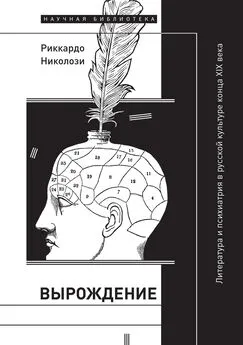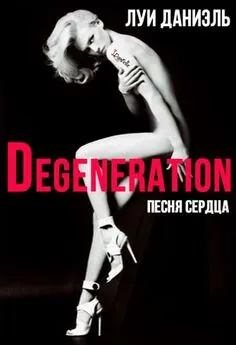Риккардо Николози - Вырождение
- Название:Вырождение
- Автор:
- Жанр:
- Издательство:Литагент НЛО
- Год:2019
- Город:Москва
- ISBN:978-5-4448-1087-3
- Рейтинг:
- Избранное:Добавить в избранное
-
Отзывы:
-
Ваша оценка:
Риккардо Николози - Вырождение краткое содержание
Вырождение - читать онлайн бесплатно ознакомительный отрывок
Интервал:
Закладка:
1089
Roelcke V . Krankheit und Kulturkritik. Psychiatrische Gesellschaftsdeutungen im bürgerlichen Zeitalter (1790–1914). Frankfurt a. M.; New York, 1999. S. 38–179.
1090
Ярче всего этот сдвиг проявился в работах психиатра Э. Крепелина. См.: Ibid. С. 165–179; Engstrom E. J. «On the Question of Degeneration» by Emil Kraepelin (1908) // History of Psychiatry. 2007. № 18/3. P. 389–398.
1091
Weingart P. u. a . Rasse, Blut und Gene. Geschichte der Eugenik und Rassenhygiene in Deutschland. Frankfurt a. M., 1988. S. 27–138; Stepan N. Biological Degeneration: Races and Proper Places // Degeneration: The Dark Side of Progress / Ed. by J. E. Chamberlin and S. L. Gilman. New York, 1985. P. 97–120. О взаимосвязи концепции вырождения и расовой теории в психиатрии поздней царской эпохи см.: Могильнер М . Homo imperii: Очерки истории физической антропологии в России. М., 2008. С. 237–278; Eadem . Racial Psychiatry and the Russian Imperial Dilemma of the «Savage Within» // East Central Europe. 2016. № 43/1, 2. P. 99–133.
1092
Дарвин Ч . Происхождение видов путем естественного отбора // Дарвин Ч. Сочинения: В 9 т. Т. 3. Происхождение видов путем естественного отбора / Под ред А. Д. Некрасова. М.; Л., 1939. С. 316. («‹…› I use the term Struggle for Existence in a large and metaphorical sense» – Darwin Ch . The Origin of Species by Means of Natural Selection [1859]. London, 1985. P. 116.)
1093
Schnackertz H. J. Darwinismus und literarischer Diskurs. Der Dialog mit der Evolutionsbiologie in der englischen und amerikanischen Literatur. München, 1992. S. 51.
1094
О тематическом комплексе «литература и дарвинизм» см., в частности: Beer G . Darwin’s Plots: Evolutionary Narrative in Darwin, George Eliot and Nineteenth-Century Fiction. 3rd ed. Cambridge, 2009; Levine G . Darwin and the Novelists: Patterns of Science in Victorian Fiction. Cambridge, Mass.; London, 1988; Schnackertz . Darwinismus und literarischer Diskurs; Sprengel P . Darwin in der Poesie. Spuren der Evolutionslehre in der deutschsprachigen Literatur des 19. und 20. Jahrhunderts. Würzburg, 1998; Michler W . Darwinismus und Literatur. Naturwissenschaftliche und literarische Intelligenz in Österreich 1859–1914. Wien u. a., 1999; Shideler R . Questioning the Father: From Darwin to Zola, Ibsen, Strindberg, and Hardy. Stanford, 1999; Carroll J . Literary Darwinism: Evolution, Human Nature, and Literature. New York; London, 2004; Ajouri Ph . Erzählen nach Darwin. Die Krise der Teleologie im literarischen Realismus: Friedrich Theodor Vischer und Gottfried Keller. Berlin, 2007; The Evolution of Literature. Legacies of Darwin in European Cultures / Ed. by N. Saul and S. J. James. Amsterdam; New York, 2011; The Literary and Cultural Reception of Charles Darw in in Europe. Vol. 3–4 / Ed. by Th. F. Glick and E. Shaffer. London et al., 2014; Schümann D . Kampf ums Da(bei)sein: Darwin-Diskurse und die polnische Literatur bis 1900. Köln u. a., 2015.
1095
Дарвин Ч . Происхождение видов. С. 316. («‹…› I use the term Struggle for Existence in a large and metaphorical sense» – Darwin Ch . The Origin of Species. P. 116.)
1096
Campbell J. A. The Invisible Rhetorician: Charles Darwin’s «Third Party» Strategy // Rhetorica. 1989. № 7/1. P. 55–85; Idem. Scientific Discovery and Rhetorical Invention: The Path to Darwin’s Origin // The Rhetorical Turn: Invention and Persuasion in the Conduct of Inquiry / Ed. by H. W. Simons. Chicago; London, 1990. P. 58–90; Idem. Charles Darwin: Rhetorician of Science // Landmark Essays on Rhetoric of Science: Case Studies / Ed. by R. A. Harris. Mahwah, 1997. P. 3–17; Depew D. J. The Rhetoric of the Origin of Species // The Cambridge Companion to the «Origin of Species» / Ed. by M. Ruse and R. J. Richards. Cambridge, 2009. P. 237–255. Сам Дарвин определяет «Происхождение видов» как «одно длинное доказательство» ( one long argument ) ( Дарвин Ч . Воспоминания о развитии моего ума и характера (Автобиография) // Дарвин Ч. Сочинения: В 9 т. Т. 9. Записные книжки. Дневники. Воспоминания. Жизнь Эразма Дарвина / Под ред. В. Н. Сукачева. М., 1959. С. 166–242. С. 240. ( Darwin . The Origin of Species. P. 435.)
1097
По словам Алана Гросса, наука – это «риторическое предприятие, сосредоточенное на убеждении» («‹…› a rhetorical enterprise, centered on persuasion») ( Gross A. G. The Rhetoric of Science. Cambridge; London, 1990. P. 6). Об исследованиях в области риторики науки см., в частности: The Rhetorical Turn: Invention and Persuasion in the Conduct of Inquiry / Ed. by H. W. Simons. Chicago; London, 1990; Pera M . The Discourses of Science. Chicago, 1994; Kitcher Ph . The Cognitive Functions of Scientific Rhetoric // Science, Reason, and Rhetoric / Ed. by H. Krips et al. Konstanz; Pittsburgh, 1995. P. 47–65; Nate R . Rhetorik und der Diskurs der Naturwissenschaften // Die Aktualität der Rhetorik / Hg. von H. F. Plett. München, 1996. S. 102–119; Landmark Essays on Rhetoric of Science: Case Studies / Ed. by R. A. Harris. Mahwah, 1997; Rhetorical Hermeneutics. Invention and Interpretation in the Age of Science / Ed. by A. G. Gross and W. M. Keith. New York, 1997; Fahnestock J . Rhetorical Figures in Science. New York; Oxford, 1999; Ceccarelli L . Shaping Science with Rhetoric. The Cases of Dobzhansky, Schrödinger and Wilson. Chicago; London, 2001; Gross A. G. Starring the Text. The Place of Rhetoric in Science Studies. Carbondale, 2006. Критическую рефлексию о риторике науки и некоторых ее радикально-конструктивистских позициях см. в: McGuire J. E., Melia T. Some Cautionary Strictures on the Writing of the Rhetoric of Science // Rhetorica. 1989. № 7/1. P. 87–99; McGuire J. E., Melia T. The Rhetoric of the Radical Rhetoric of Science // Rhetorica. 1991. № 9/4. P. 301–316.
1098
Классическим примером исследования в области научной риторики, сосредоточенного на форме подачи, служит работа Чарльза Базермана, в которой анализируются причины неуспеха первой редакции «Оптики» Исаака Ньютона и риторические средства, позволившие второй достичь высокой убедительности ( Bazerman Ch . Shaping Written Knowledge: The Genre and Activity of the Experimental Article in Science. London, 1988. P 80–127).
1099
Campbell . Scientific Discovery and Rhetorical Invention. P. 86.
1100
Дарвин использует риторические аргументы в целях открытия и обоснования, т. е. отводит им такую же конститутивную роль, что и абдуктивным, дедуктивным и индуктивным умозаключениям ( Pera . The Discourses of Science. P. 71–88). См. также: Waters K. C. The Arguments in the Origin of Species // The Cambridge Companion to Darwin / Ed. by J. Hodge and G. Radick. Cambridge, 2003. P. 116–139.
1101
Bowler P. J. Evolution: the History of an Idea. Berkeley et al., 1984. P. 156–172.
1102
Pera . The Discourses of Science. P. 74.
1103
Beer G . Darwin’s Plots: Evolutionary Narrative in Darwin, George Eliot and Nineteenth-Century Fiction. 3rd ed. Cambridge, 2009. P. 44–96; Young R. M. Darwin’s Metaphor. Nature’s Place in Victorian Culture. Cambridge et al., 1985. P. 79–125; Bulhof I. N. The Language of Science: A Study of the Relationship between Literature and Science in the Perspective of a Hermeneutical Ontology, with a Case Study of Darwin’s The Origin of Species. Leiden et al., 1992. P. 57–91; Schnackertz H. J. Darwinismus und literarischer Diskurs. Der Dialog mit der Evolutionsbiologie in der englischen und amerikanischen Literatur. München, 1992. S. 26–62.
1104
Blumenberg H . Paradigmen zu einer Metaphorologie. Frankfurt a. M., 1998. S. 10.
1105
Хотя в теории науки и в теории аргументации признается эвристическая функция метафоры и заключений по аналогии, средствами логического доказательства они не считаются. Так, Хаим Перельман полагает, что аналогия способствует формированию гипотезы, однако не принадлежит к сфере «онтологии» ( Perelman Ch . Das Reich der Rhetorik. Rhetorik und Argumentation. München, 1980. S. 120–121). Об этом см. также: Gabriel G . Logik und Rhetorik der Erkenntnis. Zum Verhältnis von wissenschaftlicher und ästhetischer Weltauffassung. Paderborn u. a., 1997. Именно эпистемологическая роль дарвиновских метафор, несмотря на их непропозициональный характер, делает их такими интересными с точки зрения риторики науки. О когнитивной и эпистемологической функциях метафоры в научном дискурсе см., в частности: Metaphor and Thought / Ed. by A. Ortony. Cambridge, 1979; Bono J. J. Science, Discourse, and Literature. The Role/Rule of Metaphor in Science // Literature and Science. Theory and Practice / Ed. by S. Peterfreund. Boston, 1990. S. 59–89; Metapher und Innovation. Die Rolle der Metapher im Wandel von Sprache und Wissenschaft / Hg. von L. Danneberg u. a. Bern u. a., 1995; Baake K . Metaphor and Knowledge. The Challenges of Writing Science. New York, 2003; Brandt Ch . Metapher und Experiment. Von der Virusforschung zum genetischen Code. Göttingen, 2004.
1106
Depew . The Rhetoric of the Origin of Species .
1107
Sieferle P. Bevölkerungswachstum und Naturhaushalt. Studien zur Naturtheorie der klassischen Ökonomie. Frankfurt a. M., 1990. S. 72–74.
Читать дальшеИнтервал:
Закладка:









